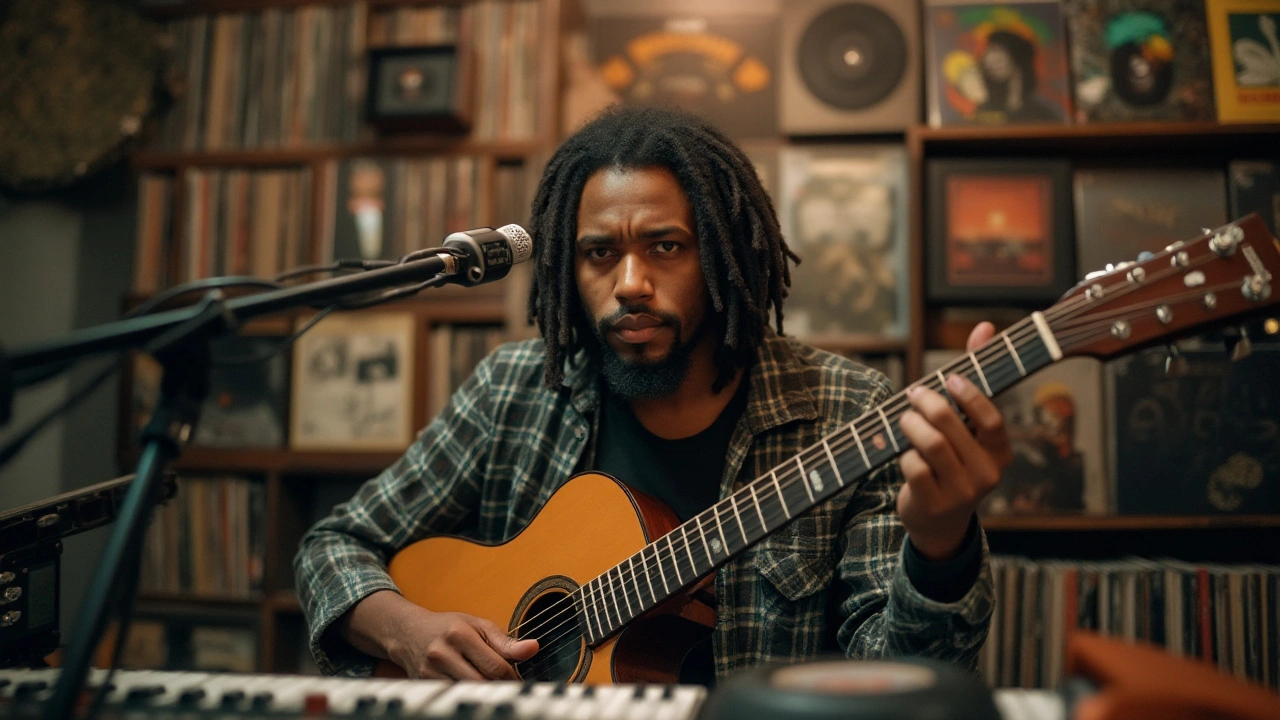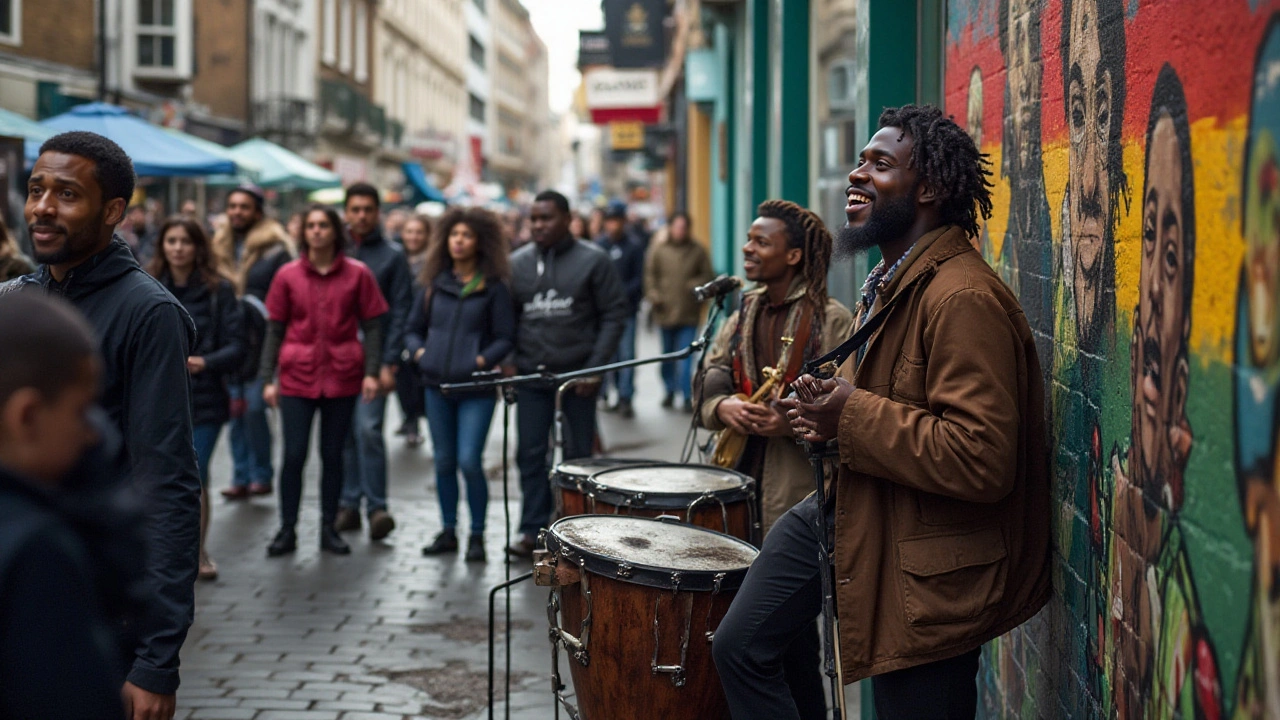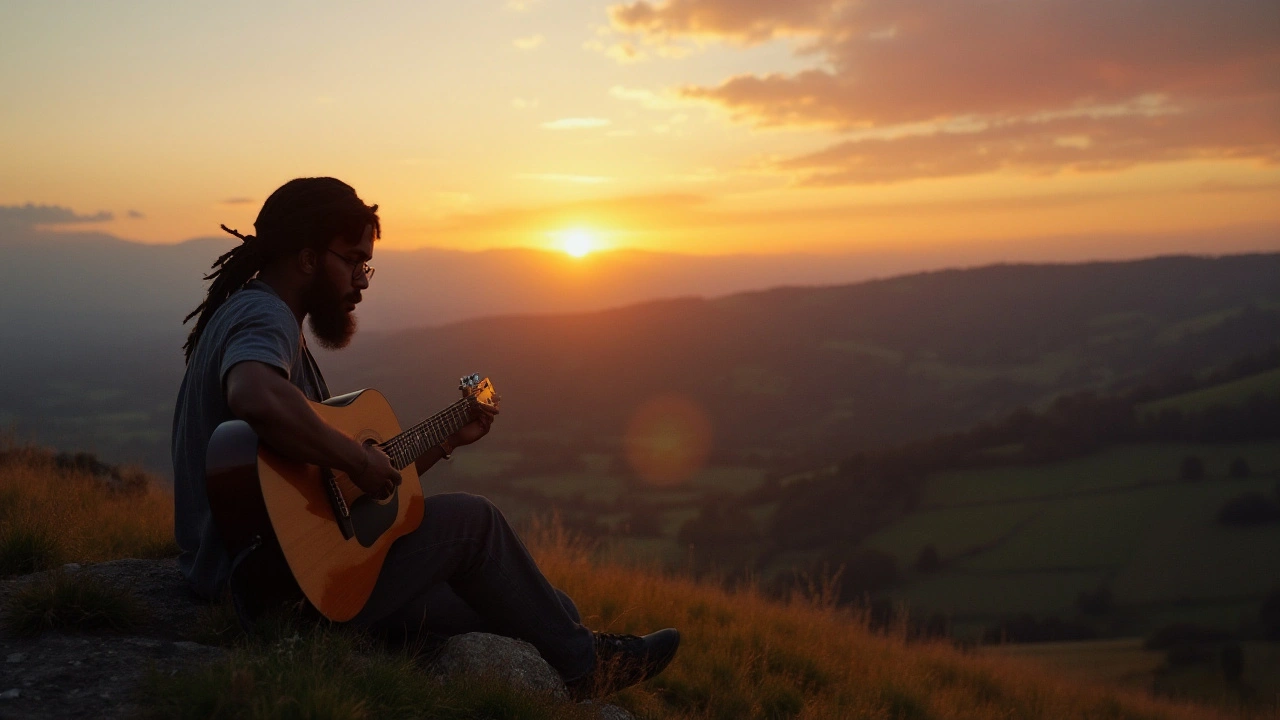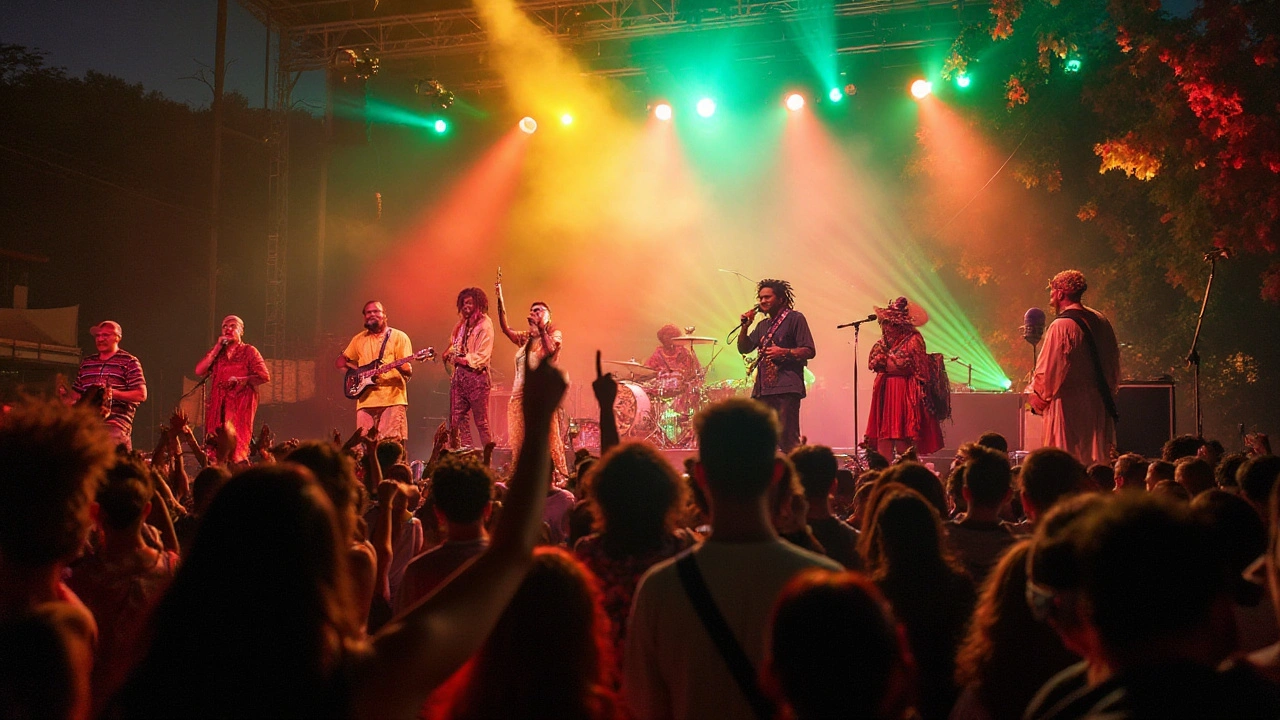Reggae music, a genre born in the vibrant heart of Jamaica, transcended its origins to enchant the entire globe. Its unique sound, characterized by a rhythmic offbeat and socially conscious lyrics, has influenced a multitude of music genres, weaving its way into the fabric of modern music.
From Bob Marley's anthems that called for unity and change to the genre's steady rhythm that make audiences sway, reggae has gifted other genres with its spirit and style. This exploration uncovers the ways reggae has blended with rock's energy, pop's allure, hip-hop's flow, and electronic beats, creating a symphony of cultural harmony that continues to evolve today.
Roots of Reggae
Reggae music, the heart and soul of Jamaica, has a rich tapestry woven from various musical traditions. To truly understand its roots, we must venture back to the 1960s when the bustling streets of Kingston echoed with sounds that would eventually birth this genre. Reggae's ancestry can be traced directly to earlier Jamaican styles such as ska and rocksteady. These genres themselves were heavily influenced by American jazz and rhythm and blues, which found their way to the island thanks to the massive sound systems set up by enterprising DJs at street parties. The pulsating rhythms, horn sections, and the charismatic vocals became the foundation upon which reggae was built. As ska evolved into the slower rocksteady, reggae took shape, characterized by its distinctive offbeat rhythm that encouraged listeners to sway gently with the music.
The socio-economic conditions of Jamaica during the late 60s and early 70s also played a significant role in reggae's development. With the country grappling with political instability and widespread poverty, reggae became an avenue for artists to voice their frustrations and hopes. It was a genre rooted deeply in protest and spirituality, often lyrically allied with the Rastafarian movement. The words spoke volumes about social justice, equality, and peace, themes that resonated with poor and marginalized communities. This connection with the Rastafarian philosophy, with its emphasis on African pride and social equality, gave reggae its spiritual dimension. A prime example is the legendary Bob Marley, whose songs continue to perpetuate the genre's core messages of hope and resistance.
Moreover, the global spread of reggae was facilitated by the phenomenon of sound clashes, where DJs and their sound systems would compete for dominance. These events became cultural exchanges where reggae was not only heard but felt, as people danced to the rhythms and absorbed the messages. A pivotal moment for reggae was the historic "Smile Jamaica" concert in 1976, advocating for peace amidst political turmoil. Bob Marley’s performance there cemented reggae’s role as a voice for change and unity. This event was a turning point, spreading reggae beyond Jamaica’s shores and into the hearts of global audiences. As the music flowed across borders, it began influencing and blending with various other genres, creating a rich global tapestry of sound.
One cannot overlook the impact of Toots and the Maytals in coining the term "reggae" itself. Their 1968 single "Do the Reggay" is considered the first song to include the word, marking the beginning of reggae as an acknowledged genre. Reggae's entrancing rhythm caught the attention of international artists, who began incorporating reggae's steady beat and social narratives into their own music. The quintessential "one-drop" rhythm, characterized by the emphasis on the third beat, is a staple that many artists experiment with today.
In sum, reggae is more than just music; it is a movement born out of a melting pot of cultural influences and historical circumstances. Its enduring influence on contemporary music is a testament to its powerful roots – roots that stretch from the streets of Kingston to a global stage. As people continue to dance to reggae’s irresistible beats, they celebrate a legacy of cultural fusion and resistance. A legacy that speaks of community, spirit, and an everlasting craving for harmony.

Reggae's Cultural Impact
Reggae music isn't just a sound; it's a cultural phenomenon with deep roots that tell the story of resistance, change, and identity. As reggae blossomed from the streets of Kingston to reach global audiences, it carried with it the visions and voices of Jamaican struggles and triumphs. These beats become the soundtrack of not merely Jamaica but a broader movement advocating for justice and equality. The rhythms of reggae echo the cries for peace and change, lending a powerful voice to the stories and spirits that inspired them, crossing borders to find resonance in countries far removed from its island origins.
One cannot overlook the impact reggae has had on the consciousness and culture of the 1970s and 1980s. The genre became an emblem for the oppressed, with its messages of social justice, political awareness, and communal harmony. Reggae artists like Bob Marley, with his effervescent charisma and uplifting lyrics, reached audiences who understood the universality of his call for change. The sonorous tones have been adopted by movements around the globe, finding their place alongside anthems of civil rights, anti-apartheid, and anti-war protests, painting the world in hues of red, gold, and green.
Beyond its political narratives, reggae's cultural influence extends into how it shapes lifestyles, fashion, and language. The laid-back yet conscious demeanor of reggae artists inspired fashion trends, adopting the colors of the Rastafarian movement—rooted in African pride and spiritual consciousness. Fashion wasn't just about style but an expression of identity, with reggae enthusiasts wearing their hearts and beliefs, quite literally, on their sleeves. The genre also introduced the distinct patois language to listeners everywhere, enriching linguistic landscapes far from Jamaica. Schools of thought inspired by reggae's messages gave rise to practices in diverse areas such as alternative medicine and sustainable living, pulling from its strides towards harmony and balance.
“Reggae music is not just vibes, it’s life’s philosophy translated into a beat.” – Unknown
The cultural impact of reggae endures today, adapting and evolving with the times while retaining its core essence. Today's globalized world embraces the diversity and unity reggae stands for, reflected in festivals worldwide, where enthusiasts gather to celebrate the joy and unity exuded by the music. Reggae remains a reminder that music, with its power to inspire change and connection, transcends more than borders. It transcends the very essence of human life and continues to influence new generations looking for light and hope in uncertain times.

Genre Crossovers
Reggae music, with its infectious rhythms and heartfelt messages, has become a cornerstone of creativity for artists across numerous music genres. The journey of reggae music into diverse sound landscapes is an intriguing tale of innovation and adaptation. One can hear the unmistakable reggae beats in the strums of rock legends like The Police. Their song "Walking on the Moon" beautifully blends rock with reggae's offbeat rhythm, creating a genre crossover that resonates with fans worldwide. This fusion introduced a broader audience to reggae's enchanting vibe and paved the way for other rock artists to experiment with its distinctive sound.
Pop music has also embraced reggae's charm, offering listeners a taste of its soulful essence. Artists like Rihanna have seamlessly incorporated reggae elements into their chart-topping hits. "Rude Boy" stands as a testament to how pop and reggae can harmoniously coexist, captivating fans and keeping reggae's influence alive in mainstream music. Pop's ability to morph and adopt different styles has made it an ideal partner for reggae, creating a vibrant and dynamic genre crossover.
The hip-hop scene, known for its lyrical prowess and cultural messages, found a kindred spirit in reggae music. This collaboration has given birth to some of the most iconic tracks in hip-hop history. The legendary duo of Nas and Damian Marley on the album "Distant Relatives" exemplifies the symbiotic relationship between reggae and hip-hop. Through shared themes of social justice and empowerment, they crafted songs that not only entertained but also inspired real-world change.
"Reggae and hip-hop are like first cousins in music," Damian Marley noted, highlighting the deep-rooted connection between the genres.
Beyond these genres, reggae's influence has spilled into electronic dance music (EDM). The bass-heavy beats and rhythmic structures of reggae have found a welcoming home in the EDM scene, leading to an explosion of reggae-infused tracks that light up dance floors worldwide. DJs and producers like Major Lazer have embraced reggae's spirit, infusing it with modern electronic sounds to create a genre crossover that thrills and excites. Musical influence from reggae in EDM is evident, offering a fresh and vibrant soundscape for listeners to explore.

Modern Influence
Reggae music's journey into the contemporary soundscape is both fascinating and profound. This genre, rooted in the soulful streets of Jamaica, has crossed oceans to blend seamlessly with today's music culture. Its beats and rhythms have inspired artists from a variety of genres, creating another layer of innovation in the modern musical milieu. From hip-hop producers to indie rock bands, the influence of reggae can be heard resonating through tracks that dominate today's charts. These elements are not mere homages but a testament to reggae's enduring appeal and its ability to communicate profound messages through simple yet powerful musical structures.
In recent years, the echoes of reggae music have found their way into pop hits as well. Artists such as Rihanna and Drake have successfully incorporated reggae into their chart-topping songs, exemplifying a foray into the mainstream music sectors. This marriage of styles has resulted in refreshing and appealing sounds that consistently captivate global audiences. Rihanna's "Work," with its unmistakable Caribbean vibes, showcases how reggae’s laid-back rhythm can transform a song into a dance sensation.
"Reggae music brings the world together, offering messages of love and unity in a turbulent age," as noted by renowned producer Stephen Marley.
Music festivals worldwide have seen a surge in the popularity of reggae-infused performances. Artists who headline such events, like Major Lazer, routinely mix electronic dance music with reggae beats, creating an electrifying atmosphere that celebrates diversity and harmony. In doing so, they introduce the distinctive reggae sound to listeners who might not be familiar with its traditional roots, further spreading its influence across the globe. The reggae sound frequently makes appearances in lounge music and chilled-out playlists, meshing perfectly with genres that prioritize mellow and calming vibes.
Another noteworthy aspect of reggae's contemporary influence is its lyrical content. By addressing themes that revolve around social justice, equity, and love, reggae remains relevant in the discussions of today's societal issues. Bands like SOJA and The Green encapsulate reggae's spirit in this manner, producing tracks that are both motivational and soothing. These messages echo the revolutionary undertones present since the genesis of reggae, continuing to promote ideals of peace and unity. In live performances, reggae-inspired artists engage audiences by crafting experiences that are not only melodically pleasing but also intellectually stimulating.

